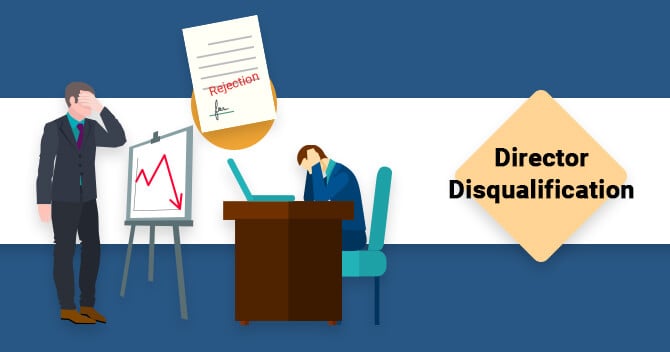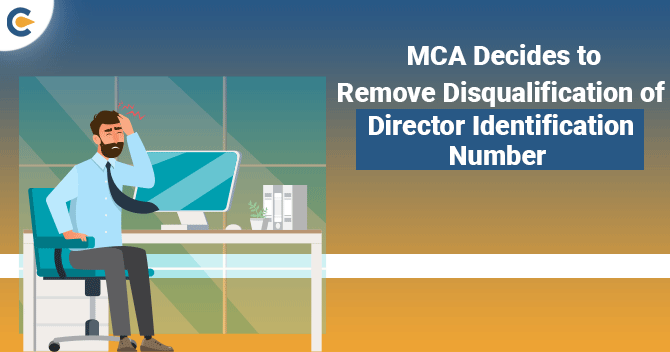Section 164, of Companies Act, 2013 provides the information on the Disqualification of Directors, i.e. the conditions in which a person could be disqualified to hold the position of a director in a company.
The title of Section 164, “Disqualifications for Appointment of Director” which clearly states the grounds on which a person can be considered to be disqualified. In this blog, we are going to study it in detail and cover all the conditions of disqualification of directors and the cases in which they can be reappointed.
What is Disqualification of Directors?
Disqualification of directors is a way of restricting a person from becoming a director or determining the conditions in which he/ she cannot be appointed as a director of a company. Furthermore, being disqualified as a company director means that he/ she cannot be appointed as the director of any company within the time period specified/ stated by the court or tribunal. But to understand the disqualification of directors, first, we are going to see who exactly is a director of a company.
Read our article:A Detailed Outlook on the Roles of Directors and Shareholders in a Company
Who is the Director of a Company?
A company itself does not have a physical existence, and it is just a legal entity. A director is a person who acts on behalf of a company. Furthermore, they are professional people hired by a company to direct them regarding company affairs. Moreover, they are often referred as the Officers of the company.
Disqualification of Directors
Section 164, provides the conditions under which a person can be disqualified to be appointed a director of a company in three subsections;
Sub-section 1:
A person shall not be allowed for appointment as a director of a company, under the following conditions;
- He/ she is of unsound mind declared by a competent court;
- If he/ she is an undischarged insolvent;
- In case he/ she has applied to be adjudicated as an insolvent, and his application is pending in the court;
- Furthermore, in case he has been convicted or found guilty by a court for any offence. It may include offences related to moral turpitude or any other offence.Furthermore, if a person has been sentenced in respect thereof to imprisonment for not less than six months and if a period of five years has not elapsed from the date of expiry of the sentence;
It is provided that if a person has been found guilty of any offence and sentenced for imprisonment for a period of seven years or more, he/ she could not ever be appointed as a director in any company.
- Also, if an order has been passed by a court or tribunal, disqualifying him for appointment as a director, and the order is still in force;
- Moreover, in cases where the director has not paid any calls related to any shares of the company held by him, alone or jointly with other officers, and six months have passed from the last day decided for the payment of the call;
- He has been accused of the offence dealing with related party transactions as per section 188 at any time during the last five years;
- Furthermore, he has not complied with subsection (3) of section 152 of Companies Act, 2013[1] ;
- He has failed to comply with the provisions of sub-section (1) of section 165.
Subsection 2
Subsection 2 states that a person will be disqualified to be appointed as a director under if he is or has been a director of a company in the following conditions;
- Which has not filed annual returns or financial statements for continuously for any three financial years
- In case the director fails to do the following tasks even after a period of one year;
- Redeem any debentures and pay interest accrued thereon
- Pay any dividend declared
- Repay the deposits accepted along with interest thereon
Sub-section 3
If a private company through its article provides any additional provisions for the disqualification of directors.
- For a period of 30 days from the date of conviction or order of disqualification;
- Where an appeal or petition is made against order and sentence within seven days until such sentence or order is disposed of;
- Seven more days are provided to such disqualified director after being ordered for the conviction, to make an appeal.
Why Directors are disqualified?
Under the Companies Act of 2013, directors can be disqualified on the grounds given below:
- In case the director has not filed the annual returns and financial statements of the company for a period of three years successively.
- Where the company fails to pay interest on deposits or fails to repay the deposit made to it.
- If the organization has failed to pay the interest due or fails in redeeming debentures on the due date.
- Failure to pay the declared dividend and continue in failing for a period of more than one year could result in disqualification of the company’s director.
The other reasons for directors’ disqualification are:
- If the director has applied for adjudicating as an insolvent.
- If any court has earlier ordered the disqualification of the director.
- If the directors does not inform about their particular shares in any company held by them alone or in collaboration.
- If the director has been convicted of any offence and sentenced to imprisonment of more than 6 months by the Court.
- If it is confirmed by any Court that the director is of unsound mind.
- If the director of the company is convicted under section 188 by the Court concerning party transactions by the director during last five years.
- The Court can disqualify the directors who are undischarged insolvent.
What is the effect of disqualification of directors?
A person once disqualified, could not be appointed a director of the company or any other company for a period of five years or for the time period as prescribed. Additionally, on the other hand, the Ministry of Corporate Affairs has been strictly enforcing these provisions to ensure compliance is maintained properly. For the same reason, the body has recently published the names of the disqualified directors on the official MCA website.
What remedies are available for the disqualification of directors?
In case of disqualification, a director can make an appeal to the National Company Law Tribunal (NCLT). Furthermore, he/she can temporarily ask for a stay order from the tribunal. Moreover, according to the Companies Act 2013, an order disqualifying a director is not effective within the next 30 days. Additionally, as soon as an appeal is initiated, the disqualified person will still continue to be the director of the company for the next seven days. Within this period, he can file his annual returns or fulfil the needs of any other conviction to stay the order of disqualification.
Reappointment of disqualified directors
However, there is no provision to reappoint a disqualified director. Furthermore, he/ she can only be reappointed if a period of five years has elapsed from the date of disqualification. However, in case the director complies with the prescribed provision or rectifies his/ her mistake, then they can be appointed as a director again.
Conclusion
As per section 252 (3) of Companies Act, it is mandatory for the company to file an application to revive itself in relation to the disqualification of directors. Additionally, this application can be made by the member, creditor or even a workman. But, the disqualified directors can not be reappointed in the same or any other company until and unless he/ she rectifies his / her mistake.
Read our article:A Complete Overview on the Types of Directors in the Privately held Organization











